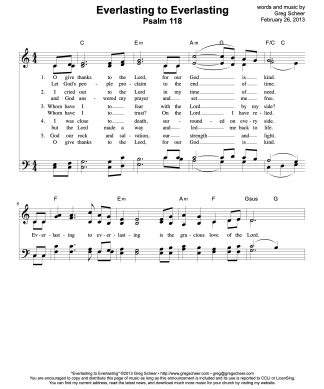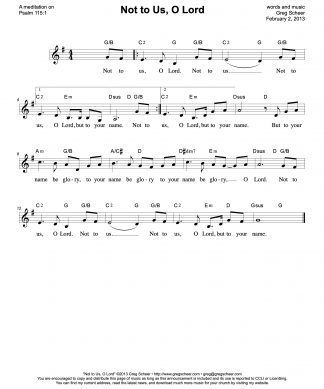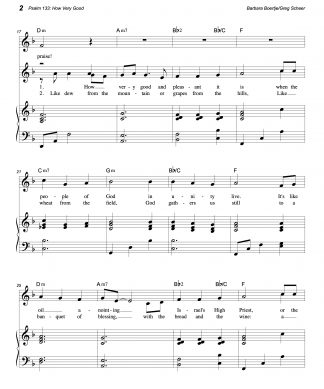Congregational Songs
Showing 169–180 of 274 results
-
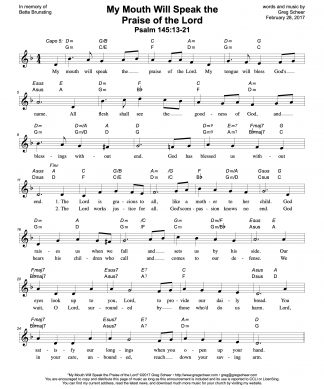
Psalm 145: My Mouth Will Speak the Praise of the Lord
$0.00 – $5.00 Select options This product has multiple variants. The options may be chosen on the product pagehttp://musicblog.gregscheer.com/psalm_145-my_mouth.mp3
The themes of God’s greatness, goodness, faithfulness, and righteousness in Psalm 145 are bookended by verses 1-2 and verse 21. In this musical setting, verse 21 becomes a refrain that follows two verses focused on God’s faithfulness and righteousness. Notice how the verse changes halfway through, with the lyrics switching from talking about God to praying to God.
-
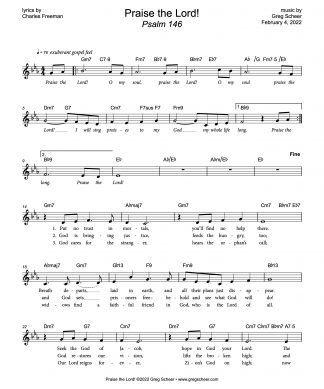
Psalm 146: Praise the Lord!
$0.00 Add to carthttps://musicblog.gregscheer.com/wp-content/uploads/psalm_146-praise_the_lord.mp3
Charles Freeman wrote this text for Psalm 146, an exuberant Psalm of trust and praise. When I sat down at the piano to write the music, I immediately heard Black Gospel. I wanted this song to sit comfortably between Andraé Crouch’s “Bless the Lord” and James Moore’s “Taste and See.”
This leadsheet is a free download. If you sing this song in your church, please report its use to CCLI or OneLicense.
-
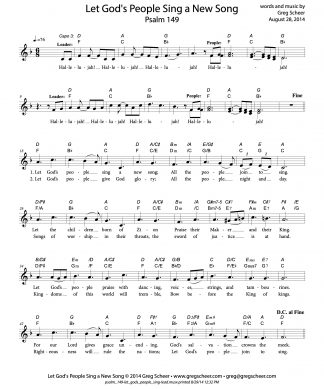
Psalm 149: Let God’s People Sing a New Song
$0.00 – $35.00 Select options This product has multiple variants. The options may be chosen on the product pagehttps://musicblog.gregscheer.com/psalm149-let_gods_people.mp3
As the Psalter ends, it erupts into a chorus of Hallelujahs and Praise the Lords, naming a plethora of instruments that should be used to make the praise even more glorious. This song follows suit, with strings, brass, harpsichord, flute, accordion, and saxophone all joining in. Of course, you don’t need all the instruments featured on the recording; you lead this with a worship band, guitar, or the piano accompaniment that’s available below.
The song was featured on the Cardiphonia album The Songs of the Psalter, Vol 5.1, part of a series that covers the entire Psalter.
-
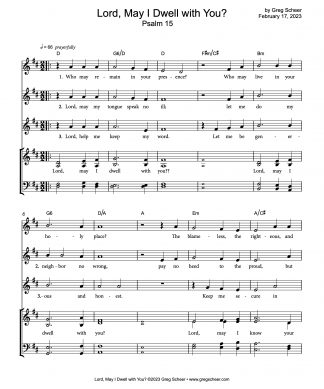
Psalm 15: Lord, May I Dwell with You?
$0.00 Add to carthttps://musicblog.gregscheer.com/wp-content/uploads/psalm_015-lord_may_i_dwell.mp3
Here, Psalm 15 becomes a sung prayer of devotion. The chorus is a prayer of aspiration, “Lord, may I dwell with you?” and the verses pray for the strength and guidance to live the godly life outlined in the Psalm. The music is in a simple, Taizé-like style, with verses chanted over the chorus. This also allows the chorus to be used independently as a scripture song, focusing on the deeper message of the Psalm: a desire to dwell in God’s presence, knowing God as a refuge and our true home.
This hymn is a free download. If you sing this song in your church, please report its use to CCLI or OneLicense.
-
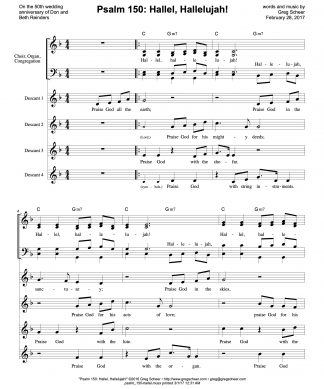
Psalm 150: Hallel, Hallelujah!
$0.00 Add to carthttp://musicblog.gregscheer.com/psalm_150-hallel_hallelujah.mp3
The exuberance and repetition in this Psalm text led me to compose a Taizé style chorus, but in a regal, rather than meditative style. You’ll notice that the song is built on a repeated 10 measure phrase. This is unusual–music is normally written in divisions of four–but the irregular phrase length keeps the repeats from feeling banal. Also keeping the song’s motion moving forward is the unresolved final chord.
This hymn is a free download. If you sing this song in your church please report its use to CCLI or OneLicense.
-
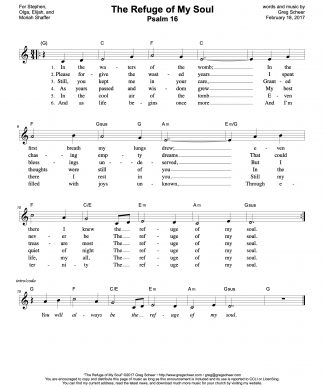
Psalm 16: The Refuge of My Soul
$0.00 – $5.00 Select options This product has multiple variants. The options may be chosen on the product page[embed]http://musicblog.gregscheer.com/psalm_016-the_refuge_of_my_soul.mp3[/embed]This song chronicles a life from birth to death under God’s care.
At first glance, it may seem like the song has little to do with the Psalm 16. It uses none of the “protect me, God” or “path of life” phrases that other settings of this Psalm use. Instead, it goes a layer deeper, into the Psalm’s structure.
Samuel Terrien proposes that Psalm 16 is made up of 6 strophes, with the first three mirroring the last three. In broad strokes, the Psalm begins its focus on things of earth and moves toward heaven. As I meditated on the Psalm it suddenly struck me that it closely follows the span of human life. It is very clear in the last two strophes, which focus on the grave and eternal life. Working your way backward, you can see further life milestones: the growth of wisdom (strophe 4) and earthly blessings (strophe 3). The first two strophes are less clear, but with a bit of imagination, I recast the first strophe’s protection and refuge as the womb and the sacrifices to false gods in strophe two as the sins of youth. It’s easier to understand when you see the Psalm and my song side by side as in this PDF.
-
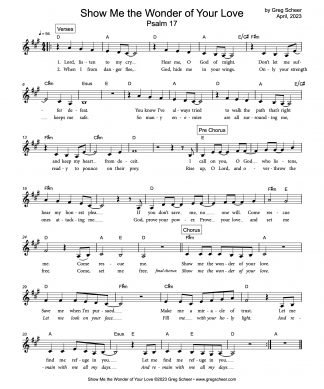
Psalm 17: Show Me the Wonder of Your Love
$0.00 Add to carthttps://musicblog.gregscheer.com/wp-content/uploads/psalm_017-show_me_the_wonder_of_your_love.mp3
In Psalm 17, the Psalmist is being pursued by enemies and calls to God for help. The six-part Psalm includes an initial appeal for God to hear, a proclamation of innocence, a petition (save me!), an accusation of the wicked, another petition, and a final word of confidence that God will save.
-

Psalm 18: I Love You, God My Lord
$0.00 Add to carthttps://musicblog.gregscheer.com/wp-content/uploads/psalm_18-i_love_you_god_my_lord.mp3
In addition to being quite long, Psalm 18 presents the difficulty of wide-ranging content. It starts with praise for God’s strength and a plea for help, then extols God’s retribution of enemies, provides an overly flattering assessment of the Psalmist’s own piety, takes joy in the strength God gives the Psalmist, and ends with more praise for the victory God will give.
Adam Carlill’s 20 verses do justice to the original while remaining accessible to modern ears. I added a refrain–it felt like the song needed something to break up all those verses. I could imagine a leader singing a few verses at a time and then handing it over to the congregation to sing the refrain.
This leadsheet is a free download. If you sing this song in your church please report its use to CCLI or OneLicense.
-
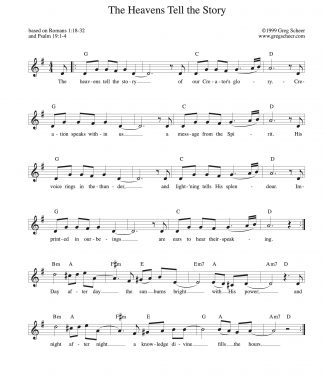
Psalm 19: The Heavens Tell the Story
$0.00 Add to cart[embed]https://musicblog.gregscheer.com/the_heavens_tell.mp3[/embed]This song places Romans 1:18-32 beside Psalm 19:1-4 for a compelling musical exposition of God’s character revealed in nature.
This leadsheet is a free download. If you sing this song in your church please report its use to CCLI or OneLicense.
-
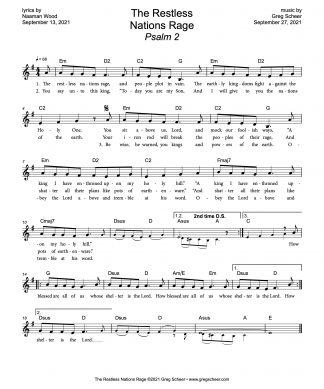
Psalm 2: The Restless Nations Rage
$0.00 Select options This product has multiple variants. The options may be chosen on the product pagehttps://musicblog.gregscheer.com/wp-content/uploads/psalm_2-the_restless_nations_rage.mp3
The great thing about Psalm 2 and Naaman Wood’s version of it is that it untangles the claims of earthly and heavenly power. In a political climate where many believe God to be on their side–or that they’re fighting on behalf of God–this Psalm lets us know that our constant wrestling for power is all for naught. God, and only God, stands above us as the ultimate power. It is only in God that we can find true refuge.
This song is mentioned in Greg’s podcast, “2021 Musical Year in Review.“
-
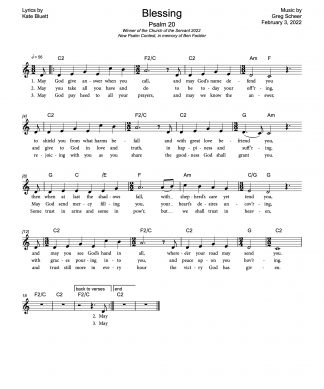
Psalm 20: Blessing
$0.00 – $20.00 Select options This product has multiple variants. The options may be chosen on the product pagehttps://musicblog.gregscheer.com/wp-content/uploads/bluett-psalm_2-blessing.mp3
Kate Bluett’s beautiful rendering of Psalm 20 is simply called “Blessing.” She has recast the language of the Psalm in a way that speaks powerfully into our own context. For example, “Some trust in chariots and some in horses” becomes “Some trust in arms and some in power.” In my estimation, this is exactly the kind of “transplanting” that should take place in modern Psalm songs.
-
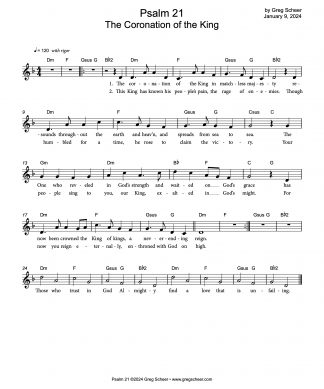
Psalm 21: The Coronation of the King
$0.00 Add to carthttps://musicblog.gregscheer.com/wp-content/uploads/psalm_021-the_coronation.mp3
This song interprets the great king of Psalm 21 through a Christological lens. We sing of Christ, the King of kings who sits at God’s right hand with all authority on heaven and earth. The theme of crowning Jesus and celebrating his victory makes this song appropriate for Christ the King or Ascension Sunday.
This leadsheet is a free download. If you sing this song in your church, please report its use to CCLI or OneLicense.
Showing 169–180 of 274 results


